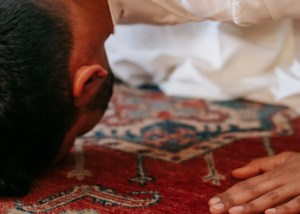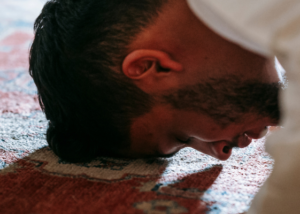Quran
Hadith
Islamic Text
No, you are not a Kafir if you do not pray. It is not Shirk (polytheism) to miss prayers. This is the majority opinion. There is a minority opinion that does consider it Kufr to neglect prayer. However, all agree that it is extremely sinful to neglect prayer.
جَابِرًا، يَقُولُ: سَمِعْتُ النَّبِيَّ صَلَّى اللهُ عَلَيْهِ وَسَلَّمَ يَقُولُ: إِنَّ بَيْنَ الرَّجُلِ وَبَيْنَ الشِّرْكِ وَالْكُفْرِ تَرْكَ الصَّلَاةِ
(Sayidina) Jabir (May Allah Most High be pleased with him) said, I heard the Prophet ﷺ saying: ‘Between a man and Shirk and Kufr is neglecting the prayer.’ (Sahih Muslim, 82 – 134).
Although the Sahih Hadith above is explicit regarding a person who leaves Salah (prayer) being a Kafir and falling into Shirk, one must still look at other related evidence. It is unacceptable for a Muslim to derive legal rulings based upon partial evidence. Rather, one must gather all related evidence prior to coming to a conclusion.
It is due to this obligation that most scholars did not take the above Hadith literally. Rather, they considered all available evidence. Subsequently, they concluded that neglecting or missing prayer does not literally make a person Kafir or Mushrik. However, it is extremely sinful and renders a person a Fasiq (sinner).
The evidence cited by the majority when substantiating the opinion that missing prayer does not render one a Kafir or Mushrik was sometimes general and sometimes specific. The general evidence is repeated in numerous authentic Hadith narrations where we are informed that everyone with Iman will enter Jannah and sins do not make a person Kafir (see link at the end).
As for evidence more specific to Salah, the authentic Hadith below is often cited. In this Hadith, we find that a person who missed prayers may well enter Jannah. Had it been Kufr or Shirk to neglect prayers, then we would not have the possibility of such a person entering Jannah. It is an irrefutable fact that a Kafir will not enter Jannah.
رَسُولَ اللَّهِ صَلَّى اللهُ عَلَيْهِ وَسَلَّمَ يَقُولُ: خَمْسُ صَلَوَاتٍ كَتَبَهُنَّ اللَّهُ عَلَى الْعِبَادِ، فَمَنْ جَاءَ بِهِنَّ لَمْ يُضَيِّعْ مِنْهُنَّ شَيْئًا اسْتِخْفَافًا بِحَقِّهِنَّ، كَانَ لَهُ عِنْدَ اللَّهِ عَهْدٌ أَنْ يُدْخِلَهُ الْجَنَّةَ، وَمَنْ لَمْ يَأْتِ بِهِنَّ فَلَيْسَ لَهُ عِنْدَ اللَّهِ عَهْدٌ، إِنْ شَاءَ عَذَّبَهُ، وَإِنْ شَاءَ أَدْخَلَهُ الْجَنَّةَ
(Sayidina) Ubadah ibn as-Samit (May Allah Most High be pleased with him) said I heard the Messenger of Allah ﷺ say, ‘There are five prayers which Allah (Most High) has prescribed upon His servants. Whoever offers them, not neglecting from them anything whilst belittling them, Allah (Most High) guarantees that He will admit him to Paradise. But whosever does not offer them, then he has no promise with Allah (Most High). If He (Most High) wills He will punish him. And if He (Most High) wills He will admit him to Paradise.’ (Abu Dawood 1420, Sahih).
The Hadith above was also narrated in Nasai (461), Ahmad (22693), Muata Malik (320) and others. Imam al-Iraqi commented on the authenticity of the Hadith:
أخرجه أَبُو دَاوُد وَالنَّسَائِيّ وَابْن مَاجَه وَابْن حبَان من حَدِيث عبَادَة بن الصَّامِت وَصَححهُ ابْن عبد الْبر. (المغني عن حمل الأسفار)
It was narrated by (Imam) Abu Dawood, al-Nasai, Ibn Maja and Ibn Hibban from Ubadah bin Samit. Ibn Abd al-Barr considered it to be Sahih. (Imam Zayn al-Deen al-Iraqi, Takhreej al-Ihyaa).
The Hadith below is another, more specific, proof. This is because this hadith speaks about people who do not know about prayer, but are still saved from the fire. Their knowledge and practice is limited to the Shahadah, yet the Hadith is clear in the fact that they will be saved from the fire as a result of it. Therefore, it demonstrates that missing prayer does not render one Kafir.
عَنْ حُذَيْفَةَ بْنِ الْيَمَانِ، قَالَ: قَالَ رَسُولُ اللَّهِ صَلَّى اللهُ عَلَيْهِ وَسَلَّمَ: “يَدْرُسُ الْإِسْلَامُ كَمَا يَدْرُسُ وَشْيُ الثَّوْبِ، حَتَّى لَا يُدْرَى مَا صِيَامٌ، وَلَا صَلَاةٌ، وَلَا نُسُكٌ، وَلَا صَدَقَةٌ، وَلَيُسْرَى عَلَى كِتَابِ اللَّهِ عَزَّ وَجَلَّ فِي لَيْلَةٍ، فَلَا يَبْقَى فِي الْأَرْضِ مِنْهُ آيَةٌ، وَتَبْقَى طَوَائِفُ مِنَ النَّاسِ الشَّيْخُ الْكَبِيرُ وَالْعَجُوزُ، يَقُولُونَ: أَدْرَكْنَا آبَاءَنَا عَلَى هَذِهِ الْكَلِمَةِ، لَا إِلَهَ إِلَّا اللَّهُ، فَنَحْنُ نَقُولُهَا.” فَقَالَ لَهُ صِلَةُ: مَا تُغْنِي عَنْهُمْ: لَا إِلَهَ إِلَّا اللَّهُ، وَهُمْ لَا يَدْرُونَ مَا صَلَاةٌ، وَلَا صِيَامٌ، وَلَا نُسُكٌ، وَلَا صَدَقَةٌ؟ فَأَعْرَضَ عَنْهُ حُذَيْفَةُ، ثُمَّ رَدَّهَا عَلَيْهِ ثَلَاثًا، كُلَّ ذَلِكَ يُعْرِضُ عَنْهُ حُذَيْفَةُ، ثُمَّ أَقْبَلَ عَلَيْهِ فِي الثَّالِثَةِ، فَقَالَ: «يَا صِلَةُ، تُنْجِيهِمْ مِنَ النَّارِ» ثَلَاثًا
(Sayidina) Hudhaifah bin Yaman (May Allah Most High be pleased with him) said that the Messenger of Allah ﷺ said, “‘Islam will wear out as embroidery on a garment wears out, until no one will know what fasting, prayer, (pilgrimage) rites and charity are. The Book of Allah (Mighty and Majestic) will be taken away at night, and not one Verse of it will be left on earth. There will be some people left, old men and old women, who will say: We saw our fathers were upon these words: ‘La ilaha illallah’ so we say them too.’ Silah said to him: What good will (saying): La ilaha illallah do them, when they do not know what prayer, fasting, (pilgrimage) rites and charity are? So (Sayidina) Hudhaifah turned away from him. He repeated it three times, and Hudhaifah turned away from him each time. Then he turned to him on the third occasion and said: ‘O Silah! It will save them from Hell,’ three times.” (Ibn Maja 4049, Sahih).
The above Hadith is also narrated in Mustadrak al-Hakim (8636) where Imam al-Dhahabi concurred that it is Sahih.
It is due to the abundance of evidence that the majority of scholars did not consider it Kufr or Shirk to miss prayers and they interpreted the Hadith narrations asserting it. However, all scholars are in agreement that the one who rejects the obligation of Salah is a Kafir since such a person is rejecting something unequivocally established in the Holy Quran.
وأجمع المسلمون أن جاحد فرض الصلاة كافر، واختلفوا في المقر بها التارك عمدًا لعملها وهو على القيام بها قادر. (شرح سنن أبي داود)
The Muslims are in agreement that the one who rejects the obligation of Salah is a Kafir (disbeliever). However, they differed regarding the one that affirms it but neglects performing it purposely whilst having the ability to do so. (Imam Ibn Raslan, Sharh Sunan Abi Dawood).
وَإِنْ كَانَ تَرَكَهُ تَكَاسُلًا مَعَ اعْتِقَادِهِ وُجُوبَهَا كَمَا هُوَ حَالُ كَثِيرٍ مِنَ النَّاسِ فَقَدِ اخْتَلَفَ الْعُلَمَاءُ فِيهِ فَذَهَبَ مَالِكٌ وَالشَّافِعِيُّ رَحِمَهُمَا اللَّهُ وَالْجَمَاهِيرُ مِنَ السَّلَفِ وَالْخَلَفُ إِلَى أَنَّهُ لَا يَكْفُرُ بَلْ يَفْسُقُ وَيُسْتَتَابُ. (المنهاج شرح صحيح مسلم بن الحجاج)
And if he neglects it due to laziness, whilst acting the obligation, as is the case with many people, the scholars have differed over this. (Imam) Malik and Shafi, May Allah (Most High) have mercy upon them, and the majority of the Salaf (early Muslims) and Khalaf (later Muslims) said that he is not a Kafir, rather, [he is] a Fasiq (sinner). (Imam al-Nawawi, Sharh Sahih Muslim).
(وَيَكْفُرُ جَاحِدُهَا) لِثُبُوتِهَا بِدَلِيلٍ قَطْعِيٍّ (وَتَارِكُهَا عَمْدًا مَجَانَةً) أَيْ تَكَاسُلًا فَاسِقٌ. (الدر المختار شرح تنوير الأبصار وجامع البحار)
The one who rejects it (the prayer) is Kafir. This is because it is established with Qati (irrefutable) evidence. However, the one who neglects it out of indolence, meaning laziness, is a Fasiq (sinner). (Imam Ala al-Deen al-Haskafi, al-Durr al-Mukhtaar Sharh Tanweer al-Absaar).
As seen in the Nusoos (texts) above, there is agreement that rejecting the obligation of Salah is Kufr. However, neglecting the Salah whilst acknowledging the obligation is not Kufr, rather it is Fisq (sinful), according to the majority opinion. May Allah Most High Bless us all with the Towfeeq to establish the prayer in the best manner.
And Allah Most High Knows Best.
-Answered by Shaykh Noorud-deen Rashid (20.02.2023)
See also:
If you commit major sins do you become Kafir?
See also video:






